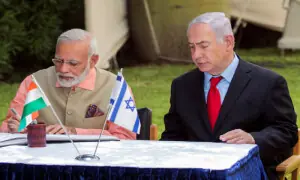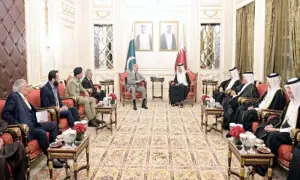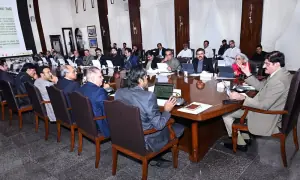ECP refutes news report of its "inability" to hold election in 90 days
3 min readThe Election Commission of Pakistan on Tuesday issued clarification pertaining to the upcoming general elections, reading that the country’s top electoral body has not issued any such handouts.
"It is necessary to clarify that the Election Commission of Pakistan has not issued any statement regarding the election," stated a tweet from the ECP’s official account.
Earlier Dawn, while quoting a senior ECP official, reported the commission’s inability to conduct general elections in three months, saying preparations would require at least six months.
Moreover, PPP Senator Raza Rabbani during the SC's hearing on the suo motu case on political crisis today expressed concerns that how, according to media reports, the ECP had said it was not possible to hold general elections within three months.
Citing various legal hitches and procedural challenges, one of the major issues is the fresh delimitation of constituencies, a senior official of the ECP was quoted as saying in the media report that was published on Tuesday. He specifically cited the case of Khyber Pakhtunkhwa where the number of seats had been increased under the 26th Amendment of the Constitution following the merger of erstwhile FATA with KP.
Talking about the delimitation exercise, the official said it was a “time-consuming” activity where the law provided for one month’s time just to “invite objections”, while another month was required to address the objections. The commission needed at least three months to complete the exercise, followed by another gigantic task of updating voters’ lists, he said.
Other challenges that may hinder ECP from holding early elections include material for election day, arranging for ballot papers, appointing and training polling staff, he added.
The official added inviting bids and scrutinising financial and technical quotations would also require some time.
Referring to the legal hitches, the official cited Section 14 of the Elections Act and said the ECP was to announce an election plan four months prior to the polls.
He also proposed the possibility of repealing laws related to electronic voting machines and the votes of overseas Pakistanis, the two laws passed by the Parliament.
The official also said the commission had announced local government (LG) polls in Balochistan on May 29, while LG elections were also due in Sindh, Islamabad and Punjab. “We will have to drop the plan for LG polls, if general elections are to be conducted."
Constitutional, legal and operational challenges
In a press release, the Free and Fair Election Network has also identified multiple constitutional, legal and operational challenges of an early election.
It added that currently the ECP was not complete as commission members from Punjab and Khyber Pakhtunkhwa have yet to be appointed. The constitutional procedure for the appointment of members after the dissolution of the National Assembly under a caretaker setup remains unclear under Article 213 (2B), which requires the prime minister and the leader of the opposition to initiate the process in a specially formed committee comprising only senators.
Another concern is the constitutional and legal status of the current delimitation of National and Provincial Assembly seats since it was carried out on the basis of provisional results of the 2017 census. “A fresh delimitation on the basis of the last preceding census officially published is, therefore, essential for the legality of future elections as per Section 17(2) of the Elections Act, 2017. However, the process of delimitation cannot be completed within three months as per the requirements of Chapter III of the Elections Act, 2017 and corresponding rules,” read the press release.
It further said the under-registration of women is also one of the major issues that the commission has started to successfully address through targeted campaigns. There are still 11.37 million women who remain unregistered as voters. In case the elections are called within three months, the electoral rolls will have to be frozen thirty days before the announcement of the election program as per Section 39 of the Elections Act, thereby rendering millions of women voters disenfranchised.
For the latest news, follow us on Twitter @Aaj_Urdu. We are also on Facebook, Instagram and YouTube.

























Comments are closed on this story.